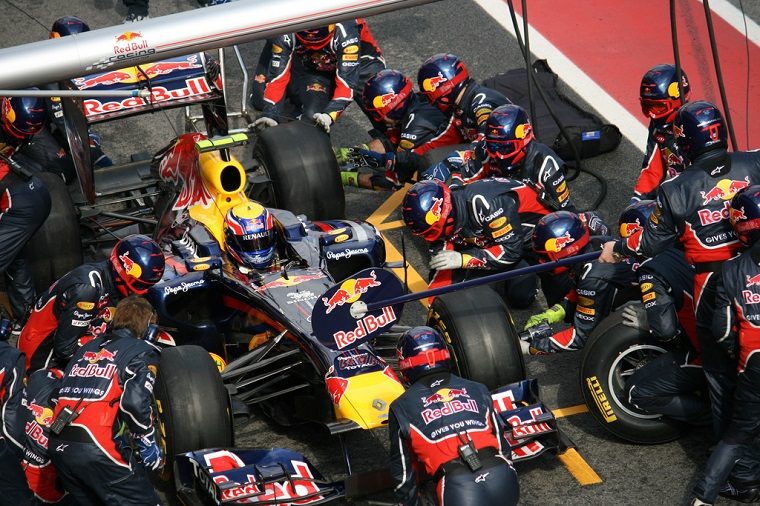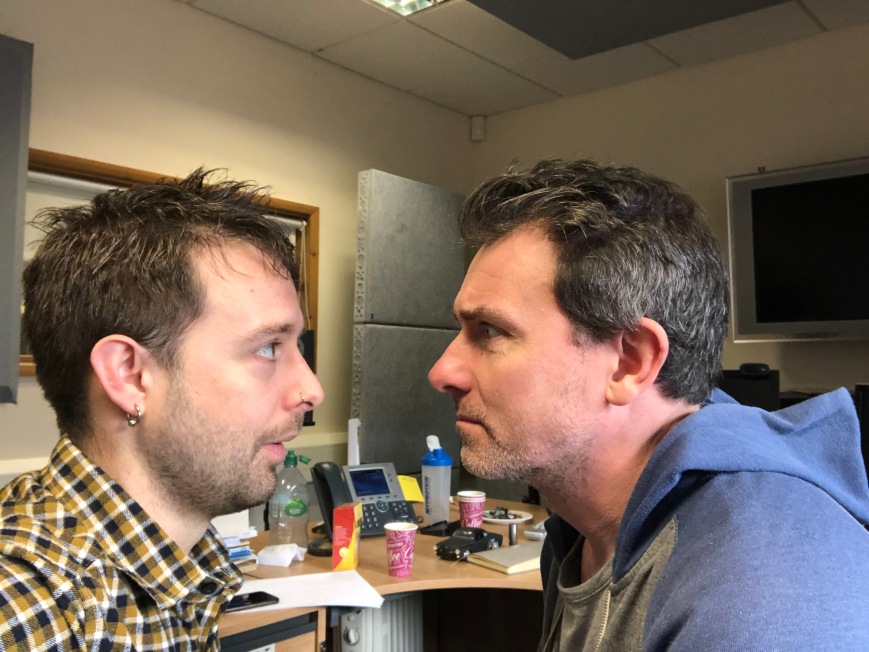Disclaimer: I’m by no means an expert when it comes to interviews; I’ve been both successful and unsuccessful when applying for jobs. Both myself and various colleagues here at Codies have interviewed applicants to work on our respective teams and as a result we’ve interviewed many applications over the years. None of this information is guaranteed to get you “that dream job” but hopefully it will help to give you an idea of what, at least some people in this industry look for when interviewing candidates.
The process
Interviews can come in a couple of flavours, sometimes you’ll have to attend more than one. From a phone interview, video interview or face-to-face interview, they can be quite daunting. Sometimes several people may grill you, other times the interview may feel more informal with the interviewer and the interviewee simply getting to know each other.
Research
Before arriving for an interview you’re going to want to do a bit of research on the company you are applying to work at. When I asked around the department everybody’s first response was to mention the importance of research. Audio lead on the DiRT franchise, Stuart Ross started off by stating “Do your research on the company, their games, recording techniques and middleware”. Dialogue producer Olly Johnson adds:
“Applicants should research the games we make as it provides a conversation starter and shows you have an interest in the company. If we can’t talk about our products then you are essentially cutting off a fair few questions I might want to ask you, putting you at a disadvantage”.
You will be quizzed by potential employers whether over the phone or in person – it’s only natural that they will want to gauge your interest in the job you are applying for. I recall a previous interview where the applicant was asked if he plays racing games his answer was “Yeah, one beginning with ‘A’ I think”. He then added “Well I haven’t played any Codemasters games but I did once play a game called Grid but I don’t think you made that”. I think he was slightly embarrassed when I mentioned that actually, Codemasters did develop Grid. Equally as strange, audio lead Jethro Dunn recalls asking an applicant what racing games they play. They avoided the answer by talking about the car a relative owns. The applicant could have simply spent a couple of hours playing a game or two and looked far better as a result.
 Applying for a job? Make sure you know a little bit about the history of the company.
Applying for a job? Make sure you know a little bit about the history of the company.
Research the company you are applying to work at. It might sound obvious but why not take half hour to browse their website and forum? Maybe head over to Wikipedia and look at a list of games the company have developed? Audio designer David Gurney was part of the interview process that saw us recruit our newest team member, Elias Browning. After an interview with Elias, Dave commented that he ‘…liked his enthusiasm, and he’d obviously done his research on the company and the staff’.
You don’t necessarily need to be the biggest fan of racing games to work here – indeed I know many developers who don’t play games or follow motorsport and they do fine. What you do need though is to show you are competent and have a vague grasp of where you are going to be working and show you are capable of at least doing a little research. Think about it this way, if we would have taken on that applicant how would I have had any confidence in him to go away and do a bit of research on a particular F1 circuit? Perhaps we want to write some interesting lines for the tannoy? Maybe we want to create ambience with the correct types of wildlife? If he didn’t research what games we’ve made in the last few years how could we expect him to research details like the length of Silverstone circuit?

You don’t need to be a race engineer to do the job. It does help to do a little research on your subject matter though.
I wasn’t a fan of F1 before moving onto the team but if I were an outsider applying for that job then I’d be sure to know who Lewis Hamilton is, a little something about the current hybrid V6 turbo power units or who’s the latest rookie destined to be a world champion? Charles Leclerc if you’re asking. If there’s not much in it between you and a fellow applicant don’t you think your chances of success might increase if you know a bit about the industry? I find myself doing these exercises even now; after all we work with F1 teams. For one this is useful when getting to know teams and engineers, you’re going to need something to talk to them about. Aside from being sociable though, imagine if I arrived in Barcelona and worked with a team I’d never heard of? Opportunities tend to crop up when you are passionate about the subject you work closely with. As such we’ve arranged further sessions or found out very useful information just by being embedded in the culture of F1. Could I feel confident sending somebody away on a recording session if they hadn’t got a clue? I realise this section has been very race-centric but this really does apply to interviews in general.
Regardless of the type of games you play you really should play or research games from the developer you are applying for. On one occasion I had an interview at a company and I’d never played any of their games so beforehand I borrowed a couple of their games and sat playing them over the weekend. You may be quizzed on the developer’s latest game or simply asked if you’ve played any of their games and if you like them. It doesn’t look particularly great to say “I’ve never played your games; er… they look good though”. Later we’ll talk more about the kind of questions you may be asked.
Arriving to a face-to-face interview
It may sound obvious but make sure you get to the interview on time. My recommendation would be to aim to arrive in the area an hour or so before the interview begins. This will allow for traffic and other hold ups and allow you to find the building. However, don’t announce your arrival hours early as your interviewer will most likely be busy with their day to day tasks or in other interviews.
Ideally you never want to be in a situation where you’re held up in traffic, you start to panic and sweat, run to the location then end up circling the building looking for the entrance. This will do nothing for your nerves and you’re probably going to look a bit of a state as well as stink upon arrival!
 He might look scary at a face to face interview but Stuart Ross is a big Scottish softie really.
He might look scary at a face to face interview but Stuart Ross is a big Scottish softie really.
How to dress
So you’ve done some research on the developer, you’ve played a couple of their games and you’ve passed the phone interview. Now you’re asked to attend a face to face. So Cinderella, what do you wear?
I may be a bit of an anomaly here; I’ve never worn a suit to an interview. My advice would be to dress appropriately, now that may sound vague but it depends on the job. Obviously if you’re applying to be a solicitor or an estate agent perhaps a suit is quite fitting. I’m guessing if you are reading this article then you have no interest in selling houses or souls though.
The games industry is pretty laid back, casual clothes are common place, with suits generally being reserved for board members and upper management, and even that is by choice. It’s not unheard of to see people roaming corridors of a dev studio in socks, slippers or dressing gowns. Ok, the dressing gown might be a rarity but yes, I’m totally serious; I’ve observed all of these in my time. And while I wouldn’t recommend you interview in your night time wear, I’m just making the point that the industry as a whole doesn’t really focus on looking smart.
Upper left – Dave Gurney
Lower left – The Duke
Right – Lorenzo, casually dressed. The mustache is an optional extra.
I doubt anybody would turn you down for a job if you arrive to the interview in a suit but you’ll look a little odd. The Duke and I once interviewed an applicant who arrived dressed in a 3 piece suit. He happened to be the best dressed person in the entire studio (and that includes senior management). Needless to say he turned a fair few heads on the way to my office; he clearly looked out of place. So what’s wrong with looking smart? It’s not the looking smart bit in itself that was the problem, indeed if he was clearly the best applicant he would haven’t been hired. The problem was he just didn’t seem to get the vibe. When working with a colleague day in day out you want to be sure you will gel with them and his attire screamed of “Hey, I don’t understand what the game’s industry is all about”. His dress was one of the main topics of conversation after he left the interview. He was a good applicant and it would have been totally sufficient for him to sell himself based on his skills, not his appearance.
Other applicants seemed to strike a good balance between not looking like they’ve crawled out of a wheelie bin and not trying to upstage a CEO. Birmingham team senior audio designer James “Duke Uterus” Kneen adds:
“The computer games industry has the advantage of being a very laid back sector to work in, however, just because your interviewer might be wearing a Slayer T Shirt and Bermuda shorts does not mean you should do the same. At the same time, dressing up too smart can show a lack of understanding of the industry. A three piece suit, pocket watch and monocle aren’t going to cut it here. So what to wear? Smart jeans or trousers, casual shoes or trainers (not dirty) a shirt and jumper would be good. Personal hygiene matters just as much as in any industry. Piercings and “creative” hairstyle like dreadlocks are cool, as long as you present reasonably clean and smart”.
How to conduct yourself
I’d expect anybody attending an interview to be their selves but maybe dial any personality traits back a few notches! When James and I interviewed Dave Gurney we could tell he would fit right in with us. A personality won’t get you the job over somebody much more skilled at an interview but it will help if you are one of a handful of candidates that the interviewers are really keen on but can’t choose between. Don’t forget, these are people you will probably end up seeing more than your own family, you have to make sure you will all get on well. After getting to know Dave his personality came out a lot more, we have a rapport and a similar sense of humour and the 3 of us can joke around but also get the work done.
Conversely James and I have interviewed applicants who are over confident, some of them come across so confident that they almost give the impression that the job is so easy it is beneath them. James adds:
“Although you don’t want to come across as a nervous wreck, be careful not to appear over confident. If you really want the position you will naturally be a little nervous. This isn’t a bad thing and shows you are respectful of the interview process and want to do well.”
One particularly overconfident candidate proceeded to talk to James and myself about RT60 (the measuring of reverb) at a race track. James glanced over at me with an odd look on his face. What was particularly odd about this was that nobody on a daily basis in this line of work refers to reverb tasks as “RT60”. This simply seemed a way for the applicant (who was applying for a junior audio design role) to let us know how much he knew about audio. It really wasn’t needed and he could have impressed us more by being down to earth and simply talking in real terms about audio design for games.
Naturally nerves will probably come through in an interview and that’s ok, just try not to let them overwhelm you. We interviewed an applicant for work experience several years back and he was actually shaking and stuttering because of how nervous he was. My only advice here would be to go into the interview and make it known that you are very nervous and hope that stating the obvious puts you a little more at ease and breaks the ice. Your interviewers might even have some words of advice to help calm you down.
Stuart Ross advises applicants to try and be concise. He’d rather somebody tell him that they don’t have an answer to a question rather than trying to make something up on the spot. He adds “In the interview be honest with your answers as waffling and buzz words don’t impress”.
Common questions
Whether a phone interview or a face to face you’re probably going to come across a couple of these questions:
- How did you create “X” in your show reel?
If you’ve provided a show reel you may be asked exactly how you created a certain element. It’s worth considering this as you are creating a show reel and perhaps apply a variety of techniques just so you have something interesting to talk about. I recall creating a show reel several years back where I decided to record some assets, create assets on a synth and use some library assets. This way I’d be able to talk about several different ways that I’d obtained assets rather than “I used library sounds and stuck them all in a timeline”.
- What do you think of the audio in our game?
I love this question; I quite often add to the applicant that I’d like it if they could critique the audio and suggest improvements. For me this is a great question to get some brownie points on rather than saying “Your game is brilliant, I love it. The audio is great.” I’d actually prefer to know what you are going to bring to the team and how you think you could help us achieve something great, rather than telling us you already think we have nailed it. You don’t have to be derogatory here; you can simply pick something you think is perhaps not as strong as other areas. Even if you don’t know how to improve this area it’s nice to see you are thinking about improvements. You might even flag up a set of assets or a system that the developers are already aware is lacking.
The type of answer I’d like to hear is something along the lines of “The impacts you have in game do not always reflect the type of material you are hitting. There doesn’t seem to be a huge difference between hitting a small object and a large object. If I had the chance to rework this system I’d add a larger variety of assets (memory permitting) at different levels of intensity. I’d also split the objects up into different material types so metal sounds like metal and concrete sounds like concrete rather than both sounding like generic impacts”.
- What games have you been playing recently?
The answer to this question may not be what’s important here. What the interviewer might actually be getting at is “Do you play games and do you have an interest in gaming?” The obvious point here is that even if you don’t get much time to play games you should probably check out what’s going on in the industry right now, what games people are talking about and squeeze in at least a few hours on a game or two. This question also shows that you are aware of what other games are currently doing and how competitor’s tech stacks up. It’s always better to take somebody on who has an idea of how they can improve and push existing tech forward and be aware of what is possible by looking at other games.
As we touched upon earlier you should also really be playing games developed by the company you are applying for.
 Been having fun playing The Witcher? Be sure to mention it. Bonus points awarded for mentioning anything you like / dislike.
Been having fun playing The Witcher? Be sure to mention it. Bonus points awarded for mentioning anything you like / dislike.
- Why do you want to work here? / Why do you want to leave your current employer?
I find these ones very difficult to answer but what I’d like to hear from a candidate is something along the lines of “I think I’ve got a skill set and ideas that I can bring to the project and I’m ready for a new challenge and I’m really interested in working on racing games, especially at a Company with a track record of creating some of the best games in the genre.” I would refrain from being overly critical of your current employer but if pressed for reasons you could reword your original answer; “I want a fresh challenge”.
- What are the considerations for a game like “X”?
Jethro recently asked applicants to spend 30 minutes coming up with a list of considerations for audio design and implementation for a racing game. This became a good talking point for the interview as applicants could then discuss the importance of areas they had focused on as well as talk about areas they had completely missed. Experienced audio designer Lorenzo Salvadori adds:
“I’d expect an applicant to point out common parameters (such as Wwise RTPCs) used in racing games to control things like tyre force. With this parameter we could then hook up skid assets and determine at what force to trigger these assets.”
Other considerations could be things like RPM values coming in from physics. We could then consider just how many other mechanical values we might receive that are being modelled. You might want a parameter for turbo pressure, clutch engagement, suspension etc… These systems will all need setting up with appropriate assets. Aside from the vehicle itself there are plenty of other considerations. There might be a parameter for how wet or dry the weather is or the time of day. What type of car has the player selected? Do different systems and parameters take effect with different vehicles? How does the system control music? Is it being triggered and left to run or is the music interactive? If so what affects the music? Is there a state being set to determine what area of the game you are in and select a new section of music? Perhaps the music evolves based on the action in game, in which case does a state change this or is there an intensity parameter that brings in new elements?
Memory management is a further consideration that could be discussed. Are you going to be loading and unloading banks based on different areas of the game? For example are banks going to be loaded just for a specific track or are all assets used across every track in game always loaded into memory? Consider in a shooting game for example, perhaps weapon assets are created to never exceed a specific file size. In which case we could look at a fixed pool of memory being reserved for a weapon which can be hot-loaded in and out as a new weapon is picked up and a previous one dropped.
- Where do you see yourself in “X” years?
James often asks questions along these lines. He states:
“There are two answers I’d be looking for here. The first would be an interest in promotions and moving up the ladder while the second would be that the applicant would hope they would be a valued member of the team, possibly specialising or having ownership over certain systems or roles within the department.”
 One day you could be in the hot seat. The first step is getting through the interview.
One day you could be in the hot seat. The first step is getting through the interview.
- Is there anything you’d like to ask us?
Here’s a chance for you to be keen, don’t just assume the answer should be “no”. When interviewing for his job, Dave Gurney asked us quite a good question. He stated: “Within 6 months how would you be expecting me to be performing and settling in?” This was actually a great opportunity to show us that he really wanted to be a part of the team and fit in. It showed that he was concerned about making sure he was doing a good job and he wanted some way to gauge his own progress. Dave goes on to add:
“I think the important thing is to not only answer the questions honestly and confidently but to also ask some good ones in return – helps to establish a two way relationship and lets both parties know where each other stands on certain issues. ‘How much holiday will I get?’ is not a good question.
I remember also asking if you had any concerns about the match between my skill set and the job because I wanted to know if there was any weaknesses you saw that I could address.”
Summary
- Research the company
- Research relevant games
- Be punctual
- Be yourself but act accordingly to the situation
- Think about some answers to common questions beforehand


